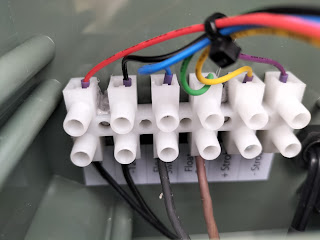Example 1: We have a solar PV system installed (Peak output 2500W) and happen to live in a Damn Sunny place. Great. So far it's chucked out ~2400kWh. Our daytime loads are the evaporative aircon (variable speed 1500w motor) and the pool pump (1600W, fixed speed, needs to run for ~8h day in summer). Together with 'normal' modern household appliances of Washing machine and dishwasher we *should* be able to balance our house load so we're roughly running "grid neutral" -- ie hardly importing or exporting during day. With the current tarrifs (feed in 8c/unit, consumption, 28c unit) it's just not cost effective to put a huge array up (ignoring the fact that we're restricted to 5kW max feed in anyway, and don't have unlimited roof space).
What I want is some smart magic load shedding intelligence - if we have sun, make sure pool pump has run for minimum amount of time. Look at weather forecast - no clouds predicted, take a chance on there being sun up till sunset (so we can predict insolation and expected output) and run for 4h morning, 4h afternoon. Spare capacity? sure - lets ramp up aircon and cool the house a little more comfortably. Oh wait - unexpected load? (dishwasher / WM on a daytime cycle) - back off the aircon, if its the dishwasher, we know that heating cycle will be over in X mins, so suspend the pump.
Sounds lovely right? sure it can be manually done watching the display on the PV inverter and the main electricity meter, but there's gotta be a better way. Well Tough. In Australia a standard domestic fusebox lurks outside, and has max 30 ways. Unless you're a licenced electrician, any poking in here is illegal, and so will cost you contractor rates. How many hours of sparky work (excluding any materials) will it take to make any cost savings negligible. Not Many. Boo.
"All of our equipment uses an dedicated communication system designed purely for our own use. Our comms system is not compatible with any other equipment and here is no protocol that we can release for external use."Maybe not then. Perhaps try Breezair? Similar story.
So, everything has to be reverse engineered (needing skills and tooling) or you pay an integrator (no there aren't any) who will charge $$$$ to do this based on previous work. Current state: Ongoing as a spare time project. Mutter.
Example 2: Air Quality Egg.
Launched with a great flourish and fanfare 2 years ago. OK there were issues with producing the prototypes, but judging from the map, there's now quite a few of us with shields, eggs and more up and running.
Now what? where's the "one year on... report with a few pretty graphs. Even if its a case of "hmm variation is too high to make out anything reasonable" at least let your users know what's going on. Otherwise they'll get bored.
How can I compare my results with others around Perth? Not easily -- takes some hacking of the site to get the raw pachube^Wcosm^Wxively feed ID and then poll it and feed into gnuplot. End-User friendly? I think not.
I *like* the idea of IoT -- it does have the potential to help do clever things - but unless the glue and costs to end user are reasonable it's just not going to take off. Yet.

